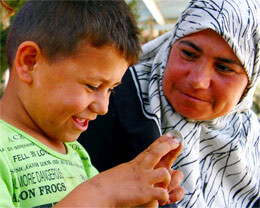Electronic Lebanon 12 June 2007

Omar Mohammed Mallas, 7, has become aggressive since his family fled the shells falling near their home. (Hugh Macleod/IRIN)
“I saw the tanks and heard the explosions and I told my Mum: ‘Let’s get out of here.’ On the way I found a piece of shrapnel that I liked but I’ve lost it now. I’m really looking forward to going home,” said Omar, sitting in the shade of a playground set up by the United Nations Children’s Agency (UNICEF) in Baddawi camp, 10km from Nahr al-Bared.
According to the latest figures from the UN agency for Palestinian refugees (UNRWA), Baddawi camp is now home to just under 13,000 of nearly 30,000 Palestinians who have been displaced by the ongoing conflict between the Lebanese army and Fatah al-Islam militants holed up in Nahr al-Bared.
With the violence now in its fourth week, UNICEF estimates that some 15,000 children from Nahr al-Bared camp, once home to up to 40,000 people, and 5,000 children from the smaller Beddawi camp have been adversely affected by the conflict.
Not only have they been displaced from their homes and have seen their schools close, but the fear of what many have seen and heard, combined with the threats of ongoing conflict and political instability, are leaving many children traumatised.
Aggressive behaviour
Omar’s mother, Fidda Ibrahim al-Haj, says her son has become aggressive and introspective since the family fled the shells falling near their home.
“Omar’s mentality has changed a lot. He used to be like every other boy. But during the four days we stayed in the camp through the bombardment he was terrified and was crying all the time,” she said. “Now he bites me or slaps my face when he wants something. He doesn’t respond when I speak to him. He wets himself and sometimes bangs his head against a wall.”
When Fidda took her son to see a psychiatrist in the Somoud clinic just outside Beddawi camp, she said Omar attacked the doctor and refused to talk about how he was feeling. The young boy has since been prescribed a daily dose of psychoactive medication.
“He is calmer today, but you should see him when he gets angry,” said Fidda. “And he cannot be away from me for a single second now. He is really attached to me.”
Jacqueline Sabah, a psychologist at the Somoud clinic, said she had seen about 350 children displaced from Nahr al-Bared suffering shock trauma or symptoms of anxiety brought on by the conflict, which began on 20 May.
“They are afraid of everything”
“They are afraid of everything,” she said. “They can’t sleep or eat and they often wet themselves. So we work either in group or in individual therapy sessions trying to encourage the children to speak about the war and about what makes them scared.”
UNICEF is playing an active role in efforts to restore some normalcy to the lives of children affected by the conflict. As well as running structured activities such as games of football in the UNICEF playground, the agency also works with local UNICEF teachers to run daily drawing and colouring classes for at least 100 children in a classroom in Baddawi.
“Any conflict-based emergency will have a particular effect on children. There is lots of confusion and they hear and see some really scary things,” said UNICEF communications officer Nichole Ireland, who has been overseeing the activities in Baddawi.
“But children are usually very resilient and if you can re-establish a safe environment, 90-95 percent will recovery naturally without the need for any clinical intervention.”
Looming war anniversary
But Ireland also warned that treating trauma in children in Lebanon posed some extra challenges.
“After a natural disaster it is possible to restore normalcy and stability to the lives of children reasonably quickly. But in Lebanon there is ongoing uncertainty and political unrest and this can continue to provoke anxiety in children,” she said.
The looming anniversary on 16 July of the outbreak of last summer’s devastating war between Lebanon’s Hezbollah militants and Israel is a further factor heightening possibilities of distress in children, said Ireland.
Hibba Deeb is a teacher at the UNICEF-run drawing class for children in Baddawi. She says the younger boys and girls have no problem drawing optimistic scenes of nature and family life. But when she asks those over nine years of age to do the same, the results are very different.
“We try and encourage the older children to draw scenes from nature, but they all draw pictures of the camp being destroyed,” said Deeb. “They draw scenes they can remember, of veiled women injured by shrapnel, of dead bodies or of themselves carrying guns. It’s almost as if they’ve been taught violence.”
This item comes to you via IRIN, a UN humanitarian news and information service, but may not necessarily reflect the views of the United Nations or its agencies. All IRIN material may be reposted or reprinted free-of-charge; refer to the copyright page for conditions of use. IRIN is a project of the UN Office for the Coordination of Humanitarian Affairs.
Related Links


